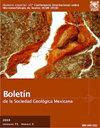Aspects of the Hydrogeology of southern Campeche and Quintana Roo, Mexico
IF 0.4
4区 地球科学
Q4 GEOLOGY
引用次数: 5
Abstract
This paper explores strong indirect evidence for existence of a previously unrecognized deep groundwater aquifer in southern Quintana Roo, adjacent parts of Campeche, and (probably) northern Belize. The region contains rocks of Cretaceous-to-Holocene age, including: 1) an up-thrust block of the late Cretaceous carbonate known in Belize as the Barton Creek Formation, which is the oldest formation exposed in the Mexican Yucatán Peninsula, 2) the Cretaceous/Paleogene Albion Formation consisting of weakly consolidated Chicxulub impact air-fall deposits, 3) the Paleocene-Eocene Icaiche Formation, containing a massive 25-35 m thick gypsum member that crops out over an estimated area of more than 10,000 km2 in the elevated interior region of the northern lowlands, and 4) younger rocks of relatively low permeability that flank the region on the east. Hydrogeology is dominated by groundwater and surface flow in and adjacent to the Rio Hondo Fault Zone (RHFZ) and by recharge in the elevated interior region. Groundwater in the elevated region has a high sulfate concentration and is approximately saturated with gypsum dissolved from the Icaiche Formation. High-sulfate groundwater and river water with a slightly lower gypsum saturation index than in the elevated region also occurs in the RHFZ, but no water of comparably high sulfate content is present elsewhere in the study area. This suggests that the elevated region is a recharge zone for high-sulfate groundwater carried eastward beneath a 50 km gap by a deep, previously unrecognized aquifer and then discharged into the RHFZ. Based on chemistry of chloride, sulfate and other ions it is proposed here that a deep aquifer comprising the strongly weathered upper surface of the Barton Creek Formation plus the overlying weakly consolidated Albion Formation connects the elevated recharge area with the RHFZ discharge area. If this composite permeable zone does extend westward beneath the elevated recharge zone, it is probably an excellent aquifer.墨西哥坎佩切南部和金塔纳罗奥的水文地质方面
本文探索了在金塔纳罗奥州南部、坎佩切州邻近地区和伯利兹北部(可能)存在一个以前未被认识到的深层地下水含水层的强有力的间接证据。该地区包含白垩纪至全新世的岩石,包括:1)晚白垩世碳酸盐岩上冲地块,在伯利兹被称为Barton Creek组,这是墨西哥Yucatán半岛上最古老的地层;2)白垩世/古近纪Albion组,由弱固结的Chicxulub撞击气落沉积组成;包含一个巨大的25-35米厚的石膏构件,在北部低地的高内陆地区估计超过10,000平方公里的面积,以及4)相对低渗透率的年轻岩石,位于东部地区的两侧。洪都断裂带(RHFZ)及其附近的水文地质以地下水和地表水流为主,内陆高架地区以补给为主。高架地区的地下水硫酸盐浓度高,且含有伊蔡彻地层溶解的石膏,接近饱和。高硫酸盐地下水和河水也出现在RHFZ,其石膏饱和指数略低于高发区,但研究区其他地方没有出现较高硫酸盐含量的水。这表明,高架区域是高硫酸盐地下水的补给区,高硫酸盐地下水由以前未被识别的深层含水层向东输送到50公里的缺口下,然后排放到RHFZ。根据氯化物、硫酸盐和其他离子的化学性质,本文提出由Barton Creek组强风化上表面和上覆弱胶结Albion组组成的深层含水层将升高的补给区与RHFZ排放区连接起来。如果这一复合渗透带确实向西延伸至高补给带之下,那么它可能是一个很好的含水层。
本文章由计算机程序翻译,如有差异,请以英文原文为准。
求助全文
约1分钟内获得全文
求助全文
来源期刊
CiteScore
1.40
自引率
12.50%
发文量
34
审稿时长
50 weeks
期刊介绍:
The Boletín de la Sociedad Geológica Mexicana is a completely free-access electronic journal published semi-annually that publishes papers and technical notes with its main objective to contribute to an understanding of the geology of Mexico, of its neighbor areas, and of geologically similar areas anywhere on Earth’s crust. Geology has no boundaries so we may publish papers on any area of knowledge that is interesting to our readers.
We also favor the publication of papers on relatively unfamiliar subjects and objectives in mainstream journals, e.g., papers devoted to new methodologies or their improvement, and areas of knowledge that in the past had relatively little attention paid them in Mexican journals, such as urban geology, water management, environmental geology, and ore deposits, among others. Mexico is a land of volcanos, earthquakes, vast resources in minerals and petroleum, and a shortage of water. Consequently, these topics should certainly be of major interest to our readers, our Society, and society in general. Furthermore, the Boletín has been published since 1904; that makes it one of the oldest scientific journals currently active in Mexico and, most notably, its entire contents, from the first issue on, are available online.

 求助内容:
求助内容: 应助结果提醒方式:
应助结果提醒方式:


